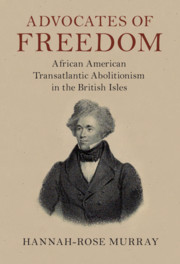Book contents
- Advocates of Freedom
- Slaveries since Emancipation
- Advocates of Freedom
- Copyright page
- Contents
- Figures
- Acknowledgments
- Dedication
- Introduction
- 1 “It Is Time for the Slaves to Speak”
- 2 “All the Bloody Paraphernalia of Slavery”
- 3 “[They Have] Not Ceased to Hold My Hand Since”
- 4 To “Frighten the Hyena Out of His Ferocity”
- 5 “I Would Much Rather Starve in England, a Free Woman, Than Be a Slave”
- 6 “Have No Fellowship I Pray You, with These Merciless Menstealers”
- 7 “My Name Is Not Tom”
- 8 “The Black People’s Side of the Story”
- Conclusion
- Bibliography
- Index
5 - “I Would Much Rather Starve in England, a Free Woman, Than Be a Slave”
Black Women and Adaptive Resistance 1850–1865
Published online by Cambridge University Press: 07 September 2020
- Advocates of Freedom
- Slaveries since Emancipation
- Advocates of Freedom
- Copyright page
- Contents
- Figures
- Acknowledgments
- Dedication
- Introduction
- 1 “It Is Time for the Slaves to Speak”
- 2 “All the Bloody Paraphernalia of Slavery”
- 3 “[They Have] Not Ceased to Hold My Hand Since”
- 4 To “Frighten the Hyena Out of His Ferocity”
- 5 “I Would Much Rather Starve in England, a Free Woman, Than Be a Slave”
- 6 “Have No Fellowship I Pray You, with These Merciless Menstealers”
- 7 “My Name Is Not Tom”
- 8 “The Black People’s Side of the Story”
- Conclusion
- Bibliography
- Index
Summary
Chapter 5 concentrates solely on Black female transatlantic tours. Due to the gendered nature of adaptive resistance, a separate chapter is necessary to chart the ways they endured a double embodiment on the Victorian stage to campaign against slavery. I argue that Ellen Craft and Julia Jackson used different versions of adaptive resistance that were conditioned by gender as well as race. Craft used silence as a performative tool, an exploitation of antislavery networks, and even created her own communal networks that were based on racial pride. While in public she exploited her reputation as a “white slave,” in private she was outspoken and was tireless in her enthusiasm to promote abolitionist and other reformist causes. In contrast to Craft’s silent public performance, Julia Jackson lectured several times on the British stage alongside her husband, which possibly made her the first Black American woman to speak publicly about her experience as an enslaved individual. African American women were central to the Black protest tradition in Britain and maintained antislavery sentiment throughout the nineteenth century, decades after the British Empire had legally abolished slavery.
Keywords
- Type
- Chapter
- Information
- Advocates of FreedomAfrican American Transatlantic Abolitionism in the British Isles, pp. 197 - 218Publisher: Cambridge University PressPrint publication year: 2020

